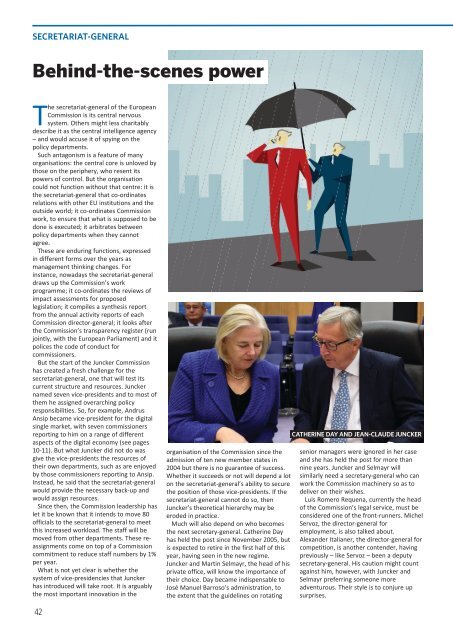Commission-companion-full
Commission-companion-full
Commission-companion-full
You also want an ePaper? Increase the reach of your titles
YUMPU automatically turns print PDFs into web optimized ePapers that Google loves.
SECRETARIAT-GENERAL<br />
Behind-the-scenes power<br />
The secretariatgeneral of the European<br />
<strong>Commission</strong> is its central nervous<br />
system. Others might less charitably<br />
describe it as the central intelligence agency<br />
– and would accuse it of spying on the<br />
policy departments.<br />
Such antagonism is a feature of many<br />
organisations: the central core is unloved by<br />
those on the periphery, who resent its<br />
powers of control. But the organisation<br />
could not function without that centre: it is<br />
the secretariatgeneral that coordinates<br />
relations with other EU institutions and the<br />
outside world; it coordinates <strong>Commission</strong><br />
work, to ensure that what is supposed to be<br />
done is executed; it arbitrates between<br />
policy departments when they cannot<br />
agree.<br />
These are enduring functions, expressed<br />
in different forms over the years as<br />
management thinking changes. For<br />
instance, nowadays the secretariatgeneral<br />
draws up the <strong>Commission</strong>’s work<br />
programme; it coordinates the reviews of<br />
impact assessments for proposed<br />
legislation; it compiles a synthesis report<br />
from the annual activity reports of each<br />
<strong>Commission</strong> directorgeneral; it looks after<br />
the <strong>Commission</strong>’s transparency register (run<br />
jointly, with the European Parliament) and it<br />
polices the code of conduct for<br />
commissioners.<br />
But the start of the Juncker <strong>Commission</strong><br />
has created a fresh challenge for the<br />
secretariatgeneral, one that will test its<br />
current structure and resources. Juncker<br />
named seven vicepresidents and to most of<br />
them he assigned overarching policy<br />
responsibilities. So, for example, Andrus<br />
Ansip became vicepresident for the digital<br />
single market, with seven commissioners<br />
reporting to him on a range of different<br />
aspects of the digital economy (see pages<br />
1011). But what Juncker did not do was<br />
give the vicepresidents the resources of<br />
their own departments, such as are enjoyed<br />
by those commissioners reporting to Ansip.<br />
Instead, he said that the secretariatgeneral<br />
would provide the necessary backup and<br />
would assign resources.<br />
Since then, the <strong>Commission</strong> leadership has<br />
let it be known that it intends to move 80<br />
officials to the secretariatgeneral to meet<br />
this increased workload. The staff will be<br />
moved from other departments. These reassignments<br />
come on top of a <strong>Commission</strong><br />
commitment to reduce staff numbers by 1%<br />
per year.<br />
What is not yet clear is whether the<br />
system of vicepresidencies that Juncker<br />
has introduced will take root. It is arguably<br />
the most important innovation in the<br />
organisation of the <strong>Commission</strong> since the<br />
admission of ten new member states in<br />
2004 but there is no guarantee of success.<br />
Whether it succeeds or not will depend a lot<br />
on the secretariatgeneral’s ability to secure<br />
the position of those vicepresidents. If the<br />
secretariatgeneral cannot do so, then<br />
Juncker’s theoretical hierarchy may be<br />
eroded in practice.<br />
Much will also depend on who becomes<br />
the next secretarygeneral. Catherine Day<br />
has held the post since November 2005, but<br />
is expected to retire in the first half of this<br />
year, having seen in the new regime.<br />
Juncker and Martin Selmayr, the head of his<br />
private office, will know the importance of<br />
their choice. Day became indispensable to<br />
José Manuel Barroso’s administration, to<br />
the extent that the guidelines on rotating<br />
CATHERINE DAY AND JEAN-CLAUDE JUNCKER<br />
senior managers were ignored in her case<br />
and she has held the post for more than<br />
nine years. Juncker and Selmayr will<br />
similarly need a secretarygeneral who can<br />
work the <strong>Commission</strong> machinery so as to<br />
deliver on their wishes.<br />
Luis Romero Requena, currently the head<br />
of the <strong>Commission</strong>’s legal service, must be<br />
considered one of the frontrunners. Michel<br />
Servoz, the directorgeneral for<br />
employment, is also talked about.<br />
Alexander Italianer, the directorgeneral for<br />
competition, is another contender, having<br />
previously – like Servoz – been a deputy<br />
secretarygeneral. His caution might count<br />
against him, however, with Juncker and<br />
Selmayr preferring someone more<br />
adventurous. Their style is to conjure up<br />
surprises.<br />
42


